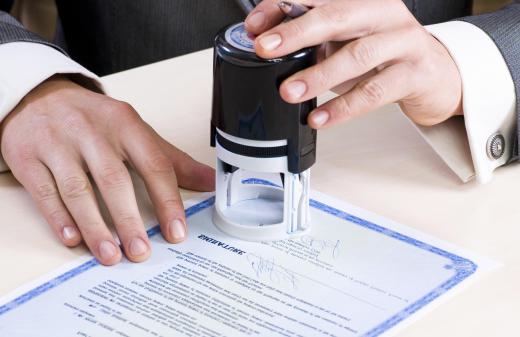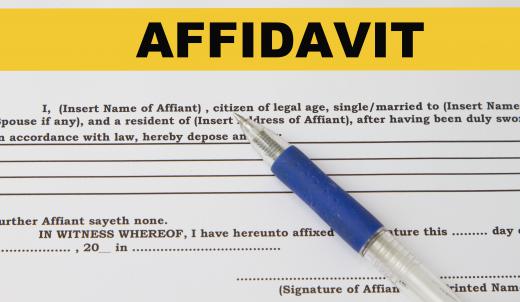A child custody affidavit is a document that is usually submitted to a court as part of a child custody case. In most cases, this document consists of statements that a person swears or confirms are factual. For example, a person who wishes to seek custody of his children may be required to submit an affidavit that details his relationship to the children involved. The affidavit may also include factual statements that reveal his reasons for seeking custody. Often, a child custody affidavit is notarized before it is submitted to the court.
Child custody affidavits are generally used to provide factual statements in a child custody case. A person may have to include his full name and information about where he resides in this document. He may also have to include information about his role in a child custody case. He may, for instance, state that he is the parent or legal guardian of the children involved. Sometimes a child custody affidavit also includes information about events that may have bearing on a custody case, such as incidents in which the children were harmed or placed at risk.

In most jurisdictions, child custody affidavits are limited to factual accounts related to child custody matters. The details included, however, are the facts as the drafter sees them. For example, a person may feel that a parent's continual lateness for visits is harmful to the children or that hitting the child involved is abuse rather than discipline. In many cases, such things are acceptable inclusions for child custody affidavits. Attacks on the other party in the case and emotional rants, however, usually have to be excluded from these documents.

When a person is involved in a child custody case, he may have to create a child custody affidavit or complete a fill-in-the blank affidavit instead. This depends on the jurisdiction and court system. If a person has a lawyer helping him with his child custody case, the lawyer may draft the affidavit for him. In such a case, the party to the child custody case may only have to sign it.

Typically, child custody affidavits have language in them that states the signer swears or affirms that the information in the document is true. Many jurisdictions require child support affidavits to be notarized as well. This means the signer takes the document to a notary public and signs it in the notary’s presence.
Frequently Asked Questions
What is an affidavit of child custody?

A child custody affidavit is a legal document that describes the child's living situation, schooling, and other significant areas of their life. It is typically utilized in family court to assist the judge in making custody and visitation decisions. The parent or guardian requesting custody signs the affidavit, which includes information on their relationship with the child, their ability to meet the child's needs, and their proposed custody arrangement.
Why is a custody affidavit essential?

It is important because it provides a clear and simple overview of the child's present living environment and proposed custody arrangement. This information is essential for the court to make an informed decision regarding the child's best interests. It also ensures that all parties involved in the custody dispute are informed of the significant details and factors that will be examined during the decision-making procedure.
What is contained in a child custody affidavit?
Typically, a child custody affidavit includes information regarding the child's living circumstances, including where they currently reside and with whom, as well as information about their schooling, healthcare, and other significant areas of their life. In addition, it may include information regarding each parent's relationship with the child, their ability to meet the child's needs, and their proposed custody arrangement. The affidavit may also contain any pertinent legal or criminal history of the parents or other household members.
How is an affidavit about child custody used in court?
A child custody affidavit is used as evidence in court to support the requested custody and visitation arrangements by one or both parents. Typically, the affidavit is filed with the court before a custody hearing, and the judge uses it to determine custody and visitation. As the information in the affidavit is regarded as being made under oath, it is essential that all statements be true and correct.
Who can fill out a custody affidavit?
In the majority of instances, either parent can complete a custody affidavit. Other individuals, such as grandparents or legal guardians, may be able to complete the affidavit in certain circumstances, such as when one parent is not participating in the child's life or when there are safety concerns. In order to identify who is eligible to complete the affidavit in a given instance, it is crucial to speak with an attorney or legal practitioner.
